Introduction
In the realm of cloud computing, Amazon Web Services (AWS) emerges as a pivotal force, shaping the landscape with its extensive suite of services that cater to diverse business needs. Since its launch in 2006, AWS has transformed how organizations operate, providing scalable solutions that empower them to innovate and optimize their processes. With its robust infrastructure supporting a wide array of industries—from media to healthcare—AWS enables companies to harness the power of data while maintaining flexibility in their operations.
As the cloud market continues to expand, understanding the advantages, challenges, and future trends associated with AWS becomes essential for organizations seeking to enhance their competitive edge and drive sustainable growth in an increasingly digital world.
Understanding Amazon Web Services: A Foundation in Cloud Computing
Amazon Web Services (AWS) serves as a cornerstone of the computing industry, providing an extensive portfolio of over 200 fully-featured services from data centers globally. Since its inception in 2006, AWS has revolutionized business operations by providing scalable computing power and versatile storage solutions, alongside advanced capabilities in artificial intelligence and machine learning. The flexible pricing models enable companies to pay solely for what they utilize, making AWS a compelling choice for enterprises of all sizes.
As Vadim Vladimirskiy, CEO of Nerdio, states,
'I started the cloud-computing firm Nerdio to transform the way SMB buys & consumes IT. It can be daunting — it requires high expertise, familiarity with lots of tech, and the vetting and testing of lots of vendors. My decision is to make that entire process completely obsolete — you don’t have to worry about OS, storage, etc., it becomes background, handled by someone else.'
This viewpoint emphasizes the difficulties encountered by numerous companies when implementing online solutions. The importance of AWS in the computing ecosystem is profound; it enables organizations to innovate rapidly, reduce costs, and significantly enhance operational efficiency through internet-based solutions.
With 11,807 views on related content, it is evident that interest in AWS remains strong. Furthermore, as described in the case study 'The Participation Age,' the infrastructure built for the participation age supports various online activities, enhancing user engagement and interaction.
As the global cloud computing market continues to grow in 2024, AWS remains at the forefront, capturing a substantial market share and influencing how businesses leverage technology to enhance their competitive edge.
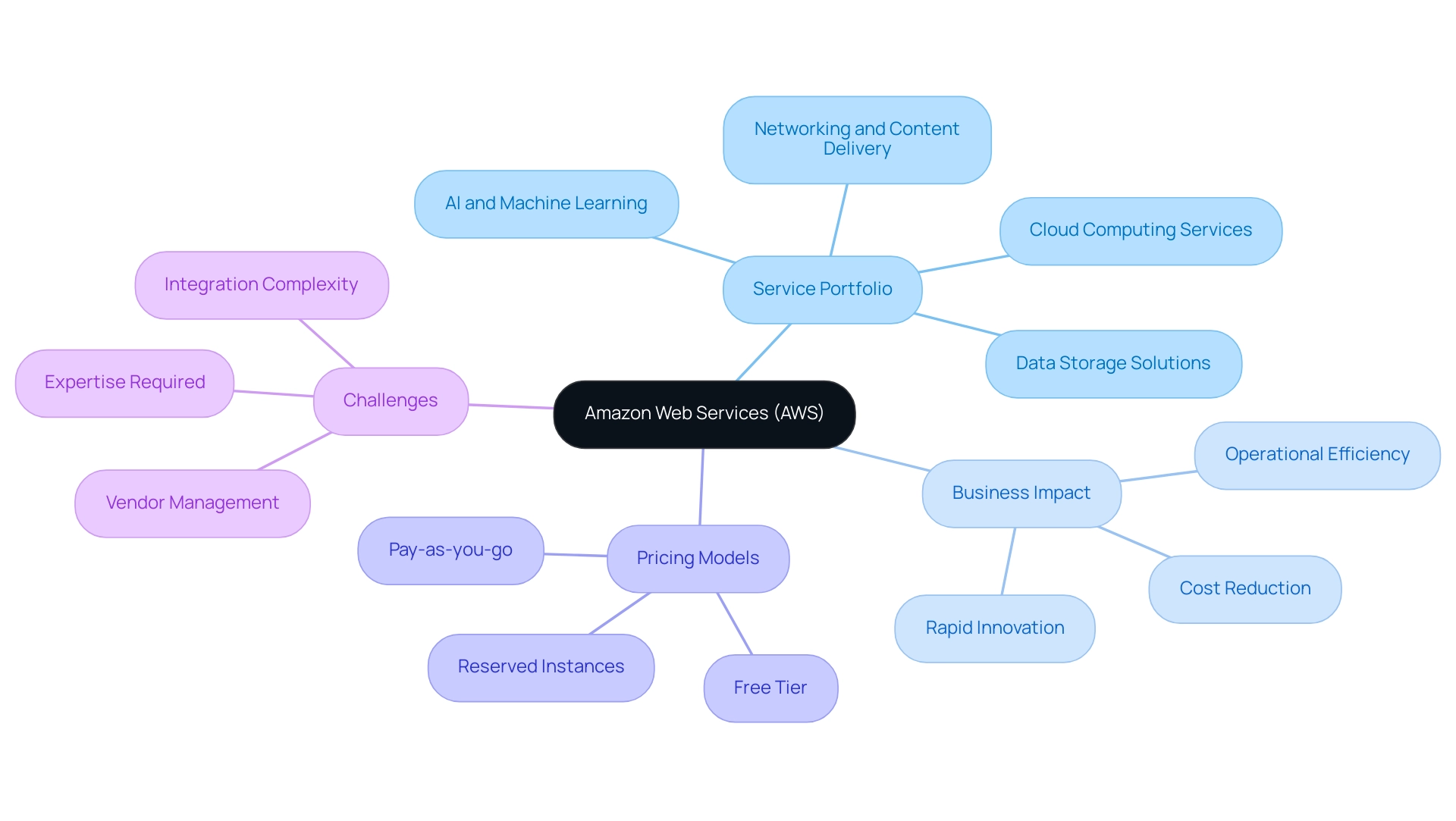
A Diverse Clientele: Companies Leveraging AWS for Success
AWS boasts a diverse clientele that spans multiple industries, including media, finance, healthcare, and technology. Notable companies leveraging AWS include:
- Netflix, which uses the platform to deliver streaming services to millions of subscribers while ensuring high availability and performance.
- The Discovery Channel, which depends on AWS for analytics and content delivery, allowing them to enhance viewer experiences.
- General Electric, which utilizes AWS for IoT applications.
- NASA, which employs AWS for data storage and processing.
This diversity in AWS's user base demonstrates its versatility and ability to satisfy the diverse needs of contemporary enterprises, establishing it as a favored option for entities seeking to utilize the potential of computing services.
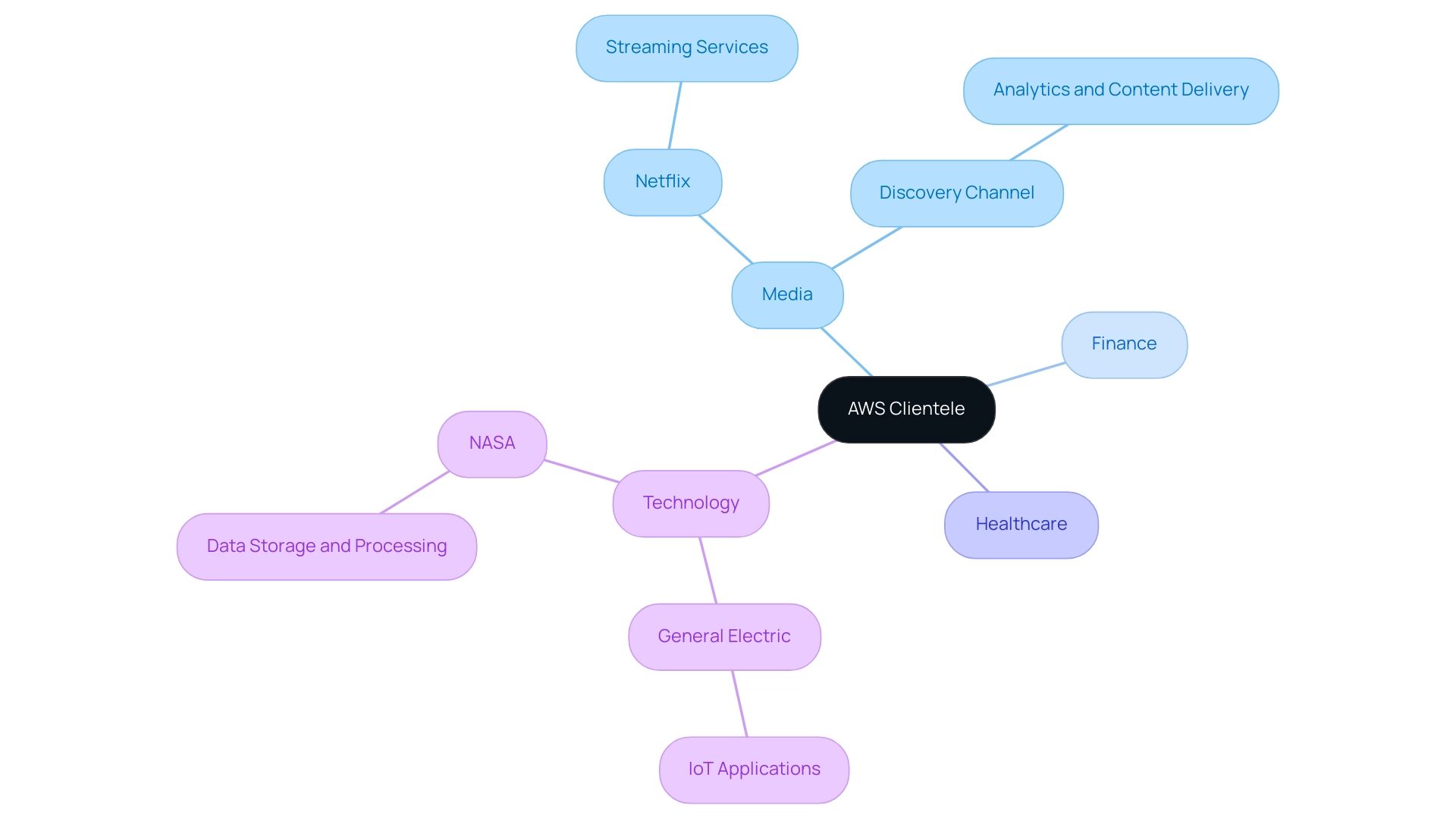
The Advantages of Using AWS: Why Companies Choose This Cloud Platform
Organizations increasingly gravitate toward AWS for a multitude of compelling reasons. Notably, its scalability empowers enterprises to dynamically adjust resources in response to fluctuating demand, thereby ensuring cost efficiency by allowing businesses to only pay for what they utilize. In fact, forty-seven percent of organizations are using AWS for significant workloads, highlighting its widespread adoption.
Furthermore, AWS boasts an extensive suite of services and tools that facilitate rapid innovation and application deployment. For example, anomaly detection algorithms can account for seasonality and trend changes in metrics, adapting to longer-range trends and effectively handling metrics that exhibit flat patterns.
Security is another cornerstone of AWS's offering; it incorporates comprehensive measures, including encryption and rigorous compliance certifications, essential for industries that handle sensitive information. Recent updates to AWS security features further enhance its offering, ensuring that businesses can operate securely in a digital environment.
The expansive global infrastructure of AWS guarantees high availability and low latency, catering to a worldwide user base. Given these advantages, AWS emerges as a premier choice for businesses aiming to enhance their operational capabilities and foster growth in an increasingly competitive landscape.
As Tanner Luxner aptly stated,
Enterprises that remain focused on digital transformation, seizing new opportunities and evolving strategic initiatives through a cost-conscious lens will be better positioned for success than their competitors.
This perspective is crucial for CTOs evaluating cloud solutions in 2024.
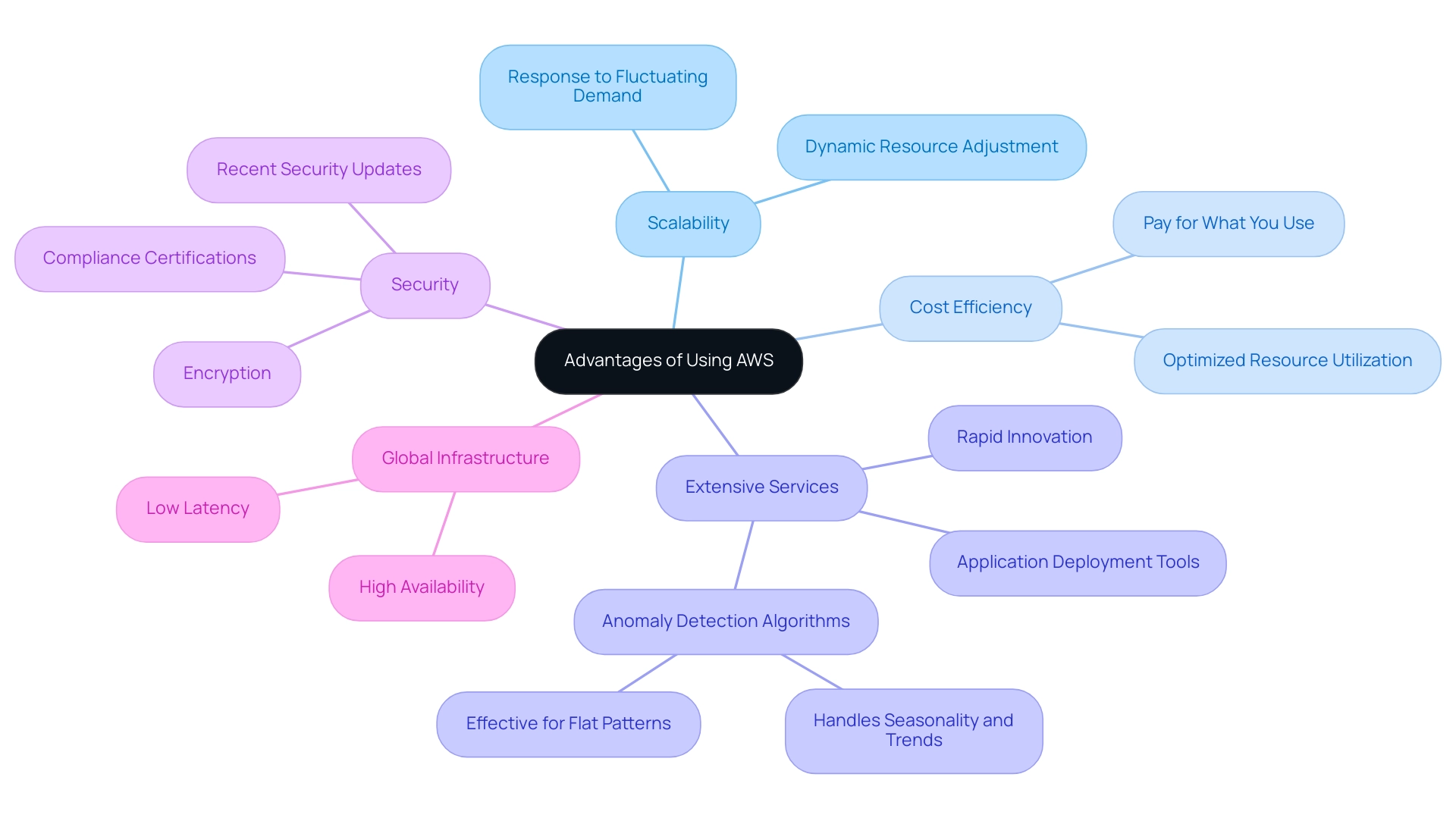
Case Studies: How Different Industries Utilize AWS
Numerous industries are leveraging AWS to bolster their operational capabilities and address sector-specific challenges. In the retail sector, for instance, Amazon employs AWS not only for managing extensive customer information but also for optimizing inventory processes, showcasing the platform's scalability and efficiency.
However, the retail sector's reliance on technical integration and inadequate security standards has led to significant breaches, such as those at Target and Subway, which underscore the urgent need for enhanced information security measures. As noted by Rhino Security Labs,
- "The Retail Industry's dependence on technical integration and poor security standards has resulted in both the Target and Subway breaches."
In response to these challenges, entities such as Rhino Security Labs provide expertise in ensuring compliance with PCI DSS and other regulatory standards. Likewise, in healthcare, entities like Pfizer utilize AWS for sophisticated analytics, enabling faster drug discovery and development.
The financial services industry also reaps significant benefits from AWS's robust security features; Capital One exemplifies this by using the platform to securely manage customer transactions, thus enhancing trust and compliance.
These case studies underscore AWS's versatility and effectiveness in tackling the unique demands of various sectors, while also addressing critical issues such as data security and operational efficiency.
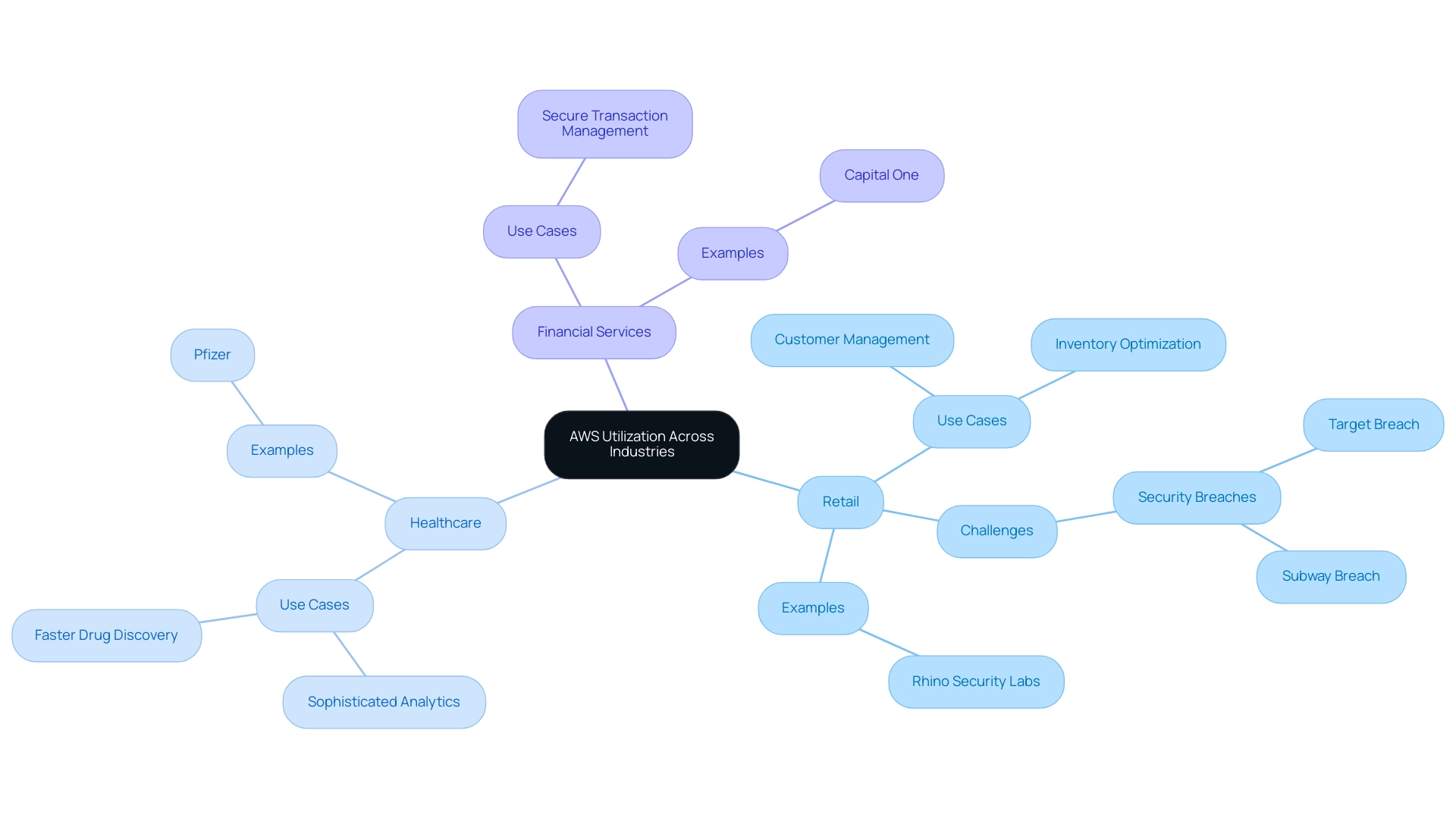
Challenges and Considerations When Adopting AWS
Although AWS offers numerous benefits, entities often face several challenges during the adoption process. One prominent issue is the inherent complexity of migrating existing systems to a remote infrastructure, which necessitates meticulous planning and allocation of resources. Additionally, it is imperative for companies to ensure their staff is proficiently trained in utilizing AWS services effectively, as skill gaps can hinder performance and productivity. Security continues to be a vital issue; entities must adopt strong best practices to protect sensitive information within the online environment.
Furthermore, the intricacies of cost management pose significant challenges; without careful monitoring, uncontrolled usage can result in unanticipated expenses that undermine budget forecasts. Significantly, forty-seven percent of entities are presently utilizing AWS for major workloads, emphasizing the increasing movement towards online solutions.
As Tanner Luxner notes,
Enterprises that remain focused on digital transformation, seizing new opportunities and evolving strategic initiatives through a cost-conscious lens will be better positioned for success than their competitors.
A case study named 'Innovation Amid Economic Volatility' demonstrates that those entities emphasizing technology investments are better positioned for success, even in difficult economic periods. By proactively identifying these challenges and crafting a comprehensive migration strategy, entities can adeptly navigate the transition to AWS, positioning themselves for long-term success in an increasingly competitive landscape.
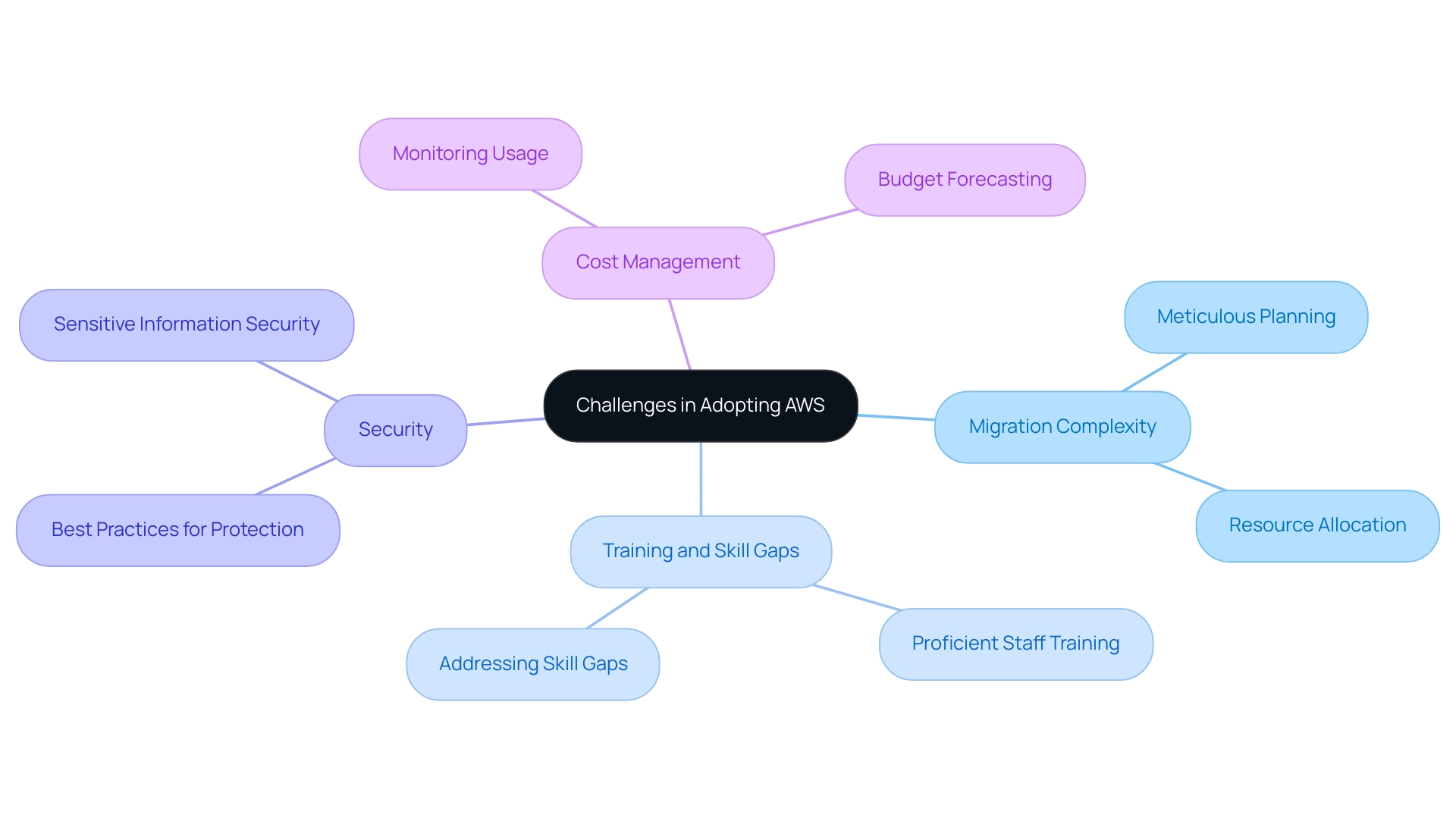
Future Trends: The Evolution of AWS and Cloud Computing
As cloud computing rapidly evolves, Amazon Web Services (AWS) is strategically positioned to lead technological advancement in the coming years. A significant trend is the growing incorporation of artificial intelligence (AI) and machine learning (ML) abilities within AWS services, enabling entities to extract, analyze, and utilize information in dynamic and impactful ways.
For instance, companies adopting these technologies can expect to enhance decision-making processes and operational efficiencies significantly. In fact, organizations that purchase more contributor seats upfront receive more favorable discount rates, illustrating the cost-effectiveness of AWS services.
Furthermore, the emergence of edge computing technologies is set to revolutionize information processing, allowing AWS to deliver faster analytics and insights by processing information closer to its source. This capability will be crucial as businesses seek to optimize their real-time data operations.
Sustainability is also becoming a pivotal focus, with AWS reinforcing its commitment to renewable energy and achieving carbon neutrality. By embracing these future trends, organizations not only enhance their current operational frameworks but also position themselves to tackle the challenges of tomorrow effectively.
As noted by Leif Åsmund M., VP of Engineering at Seven Peaks Software, "Linear has been a game-changer for our team. It's like a superhero tool for software development. It helps us work smarter, not harder. If you're serious about nailing your projects and making your team happier, give Linear a shot."
Tools like Linear exemplify the need for innovation in project management and development processes. By leveraging AWS's evolving services, businesses can utilize solutions that not only streamline operations but also contribute to a more sustainable future.
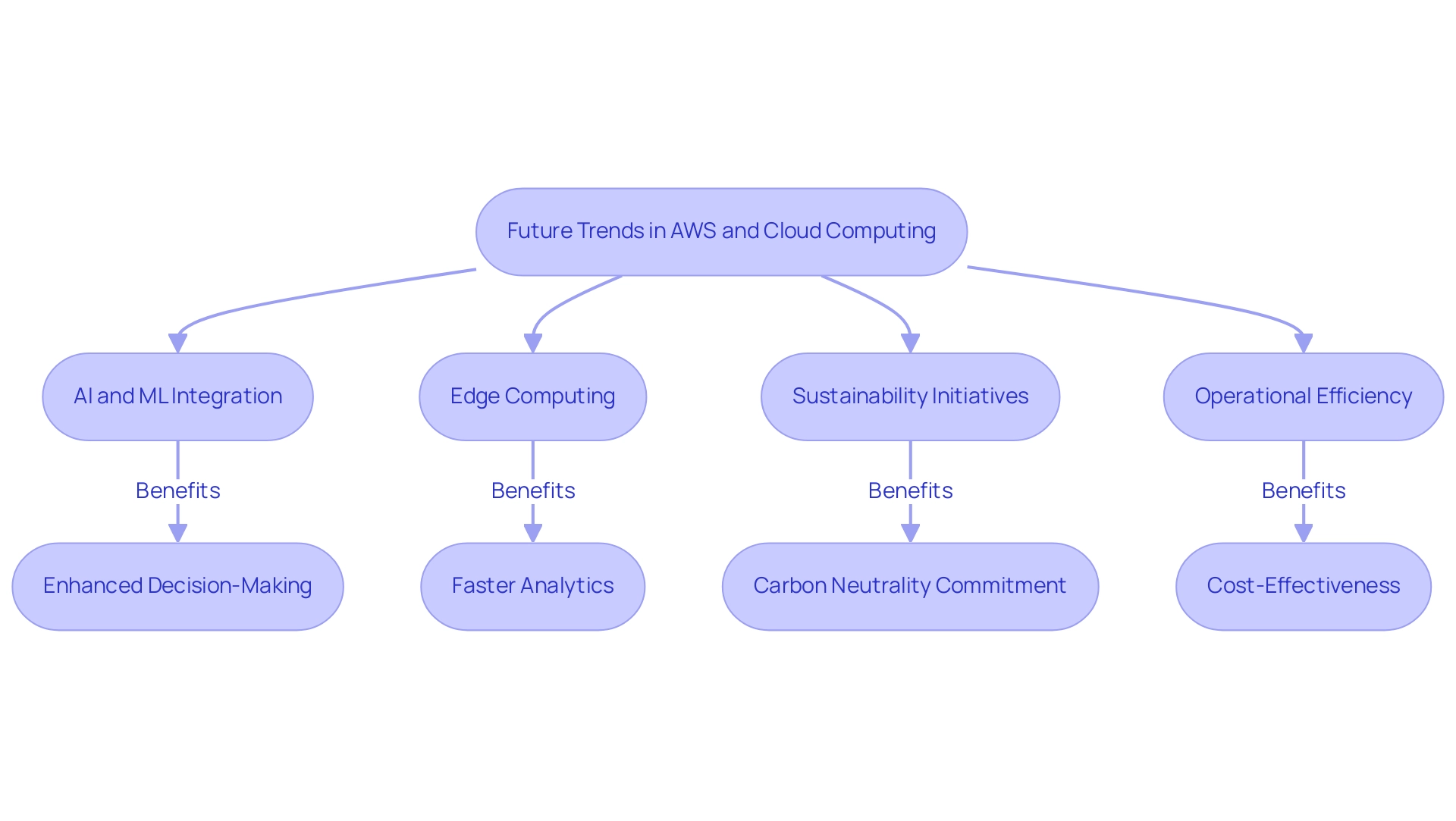
Conclusion
The exploration of Amazon Web Services (AWS) reveals its foundational role in transforming cloud computing and empowering organizations across various sectors. The extensive range of services offered by AWS, coupled with its scalability and cost-efficiency, positions it as a premier choice for businesses seeking to innovate and enhance operational efficiency. The diverse clientele, which includes industry giants like Netflix and NASA, highlights the platform's versatility and capability to meet unique demands, further solidifying its market dominance.
While the advantages of adopting AWS are compelling, organizations must also navigate challenges such as system migration complexities, skill gaps, and stringent security requirements. A proactive approach to addressing these hurdles is essential for maximizing the benefits of AWS and ensuring a seamless transition to cloud-based operations. Additionally, as the cloud landscape continues to evolve, the integration of advanced technologies like artificial intelligence and machine learning will further enhance AWS's offerings, enabling businesses to unlock new levels of operational efficiency and innovation.
In summary, AWS not only serves as a catalyst for digital transformation but also equips organizations with the tools necessary to thrive in an increasingly competitive environment. By embracing AWS's capabilities and preparing for future trends, businesses can position themselves for sustained growth and success in the digital age.




